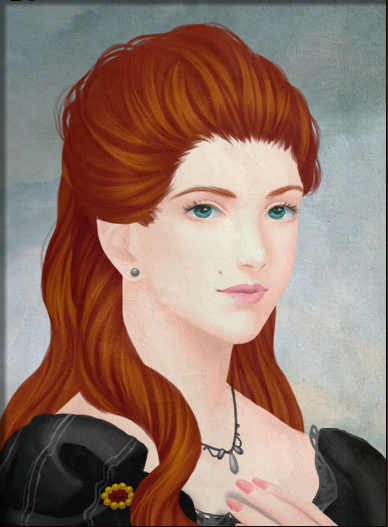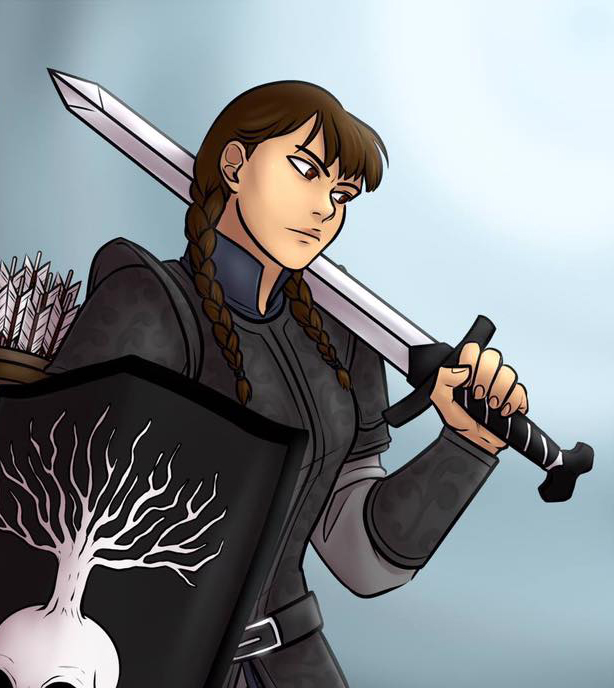Guardians of Truth
Valor: Streetwise
Home: Laatzen
Keep: The Eternal Fortress
The Guardians of Truth, the sworn knights of House Sauber, are charged with the simple and straightforward duty of defending the Eternal Keep, the ancient fortress of House Sauber since before the Throne. While this mission is straightforward, the duties of these knights are anything but.
Laatzen comes under attack more than any other city in Gotha. The attempts to take the city come from various sources. This year, a rebellious peasant army. That year, accused of treason by Fafnir in a misunderstanding worked out afterward. Another year, orc rampaging from a mountain range no cavalry caught in time. It is always something, so the Guardians of Truth are as eternally vigilant as the fortress that they guard. It has never been taken.
In order to fulfill their duty and protect the city, the Guardians of Truth maintain an information network that is vast and well-maintained. Informants are paid well for their services, and spies operate everywhere in the region so that the knights can be in position to handle threats from any direction. Knights errant are sent to far off places if the Order believes that a conspiratorial threat can be found there.
Every potential knight is vetted carefully before they are allowed entry to the order, and even for a nobleman of great lineage, it is considered an honor.
Grand Master: Simon Sauber a distant cousin to the Graf.
Simon is driven to perfection, and executes his duties to House Sauber flawlessly. Nothing of significance happens in these lands without his foreknowledge. His ability to read a person’s character comes from years of digging through reams of information in reports Hidden in the Order’s storehouse, known as the hole.
However, Simon is also a petty man. Any perceived slight is met with outward apathy, but inward he seethes. He will dig deep into the his newfound enemies life, cracking open their every secret and weakness.
Then he waits. When the moment comes, and it always comes, he shines his light of justice upon them.
He prefers to be present when the person’s life is ruined, but his ire will also be sated when they are put in their place. Many people have been ruined years after have made a jest, or a barely perceptible eyeroll. They stand accused of misdeeds, or are compelled to act against their own interests, never knowing why. But Simon knows, and that is all he needs.
Master: Denis Redler
To the world he is Sir Denis Redler, who lives in the shadow of Grandmaster Simon. Within the Order’s upper echelons he is highly respected for his amazing talents.
Denis is a good man. A patriot. In another life he might have been one of the greatest actors of his time. As it stands he is one of the greatest information gatherers in the Throne.
Denis is fluent in numerous languages and dialects. He can transform himself instantly, almost as if by magic. So convincing is he, that many who know him best wonder if he is really the Sir Denis they know, or if that is nothing more than another of his personas.
Commander: Justin Engel, Eldest Nephew of Herzog Gerrhard Engel.
Sir Justin Engel is the Hammer of the order. He is an extremely capable tactician. Every major operation, the Order sets in motion, is vetted through him. He has proven himself again and again in the field of battle. He has led several rescue operations to deliver support or extract high value targets and information.
Oddly, and seemingly in contrast, he is an extremely devout man with a gentle smile and a word of encouragement for all. He has prayed for fallen foe and comrade alike. He feeds the poor from his own personal wealth and he lives a life of extreme moderation.
Seneschal: Heribert Sauber, A ruthless man who is rumored to be very much in the Graff’s favor.
The opposite of Ser Justin Engel’s smile is the dark scowl that rests permanently on Sir Heribert Saubers face. He is rough and brutish. The only mercy given to those around him is that he is also extremely laconic.
Nothing is ever good enough for him. He often says, “good enough is the bane of greatness!” He is Loyal to the Graf and to the order. This may be the reason he stands so much in his favor, often having dinner alone with the Graf.
The man runs a tight ship, and there is much to be learned about efficiency by anyone who can tolerate him for more than a few weeks.
Marshal: Felix Hardt
Sir Felix Hardt can best be summed up as meticulous. He’s a good man with a good heart but he can’t wrap his head around politics. This makes him an awful noble. However, it is not surprising for an upjumped Knight.
He proved himself on the field of battle, he’s a fair blacksmith and he knows horseflesh like no other. So he here sits, the Marshal. A great Marshal but unlikely to ever rise any higher.
When asked about this he simply says, “this be more’n i e’er had or imagined. I am plenty happy here.”
Under-Marshal: Ulrich Stricker
Sir Ulrich Stricker is an upjumped knight with visions of greatness. He has risen quickly to the position of under marshal and has performed admirably. He wants to rise, and those above him are acutely aware of such. However, unbeknownst to him the one thing that stands in him in their favor is that he has thus far refused to compromise his integrity to do so.
Grandmaster Simon Sauber has tested him 3 times and each time the man has simply reported his findings to his direct superior as expected. He has not gone out of his way to attract the attention of his superiors, despite the fact taht he possess the obvious political acumen to know that it would likely speed his promotion.
He will soon receive a call to be the Grandmaster’s personal assistant.
Standard Bearer: Norbert Wagner
Sir Norbert Wagner is newly Knighted. His family is minor nobility in good standing with House Sauber.
He seems oddly fond of the Seneschal, Sir Heribert Sauber, and will often make excuses, for him, when any of the others grumble about his abrasive disposition. He was Ser Heribert’s squire until he was knighted.
He’s got a good head on his shoulders, and share’s his former knights attention to detail. However it is contained in a much more palatable disposition.
Treasurer: Alfons Blum
Sir Alfons handles all the financial affairs for the order. All of the records and hand written in triplicate and everything is in its place.
When the Graff sends his annual auditor’s down Alfons smiles. He patiently waits for them tea in hand. He greets them and then escorts them to his personal sanctuary, the records room.
He has been the treasurer for 10 years. in those 10 years he has never had a single question raised on his bookkeeping, and the order has made a modest profit.
The Guardians of Truth are among the best provisioned knights in the Throne, and that is due in no small part to Ser Alfons Blum’s acumen.
Draper: Leo Otto
Sir Leo Otto believes that the uniform makes the man. He holds weekly inspections, and does random spot inspections. By direct order from Sir Leo Otto, ALL Knights, and squires, about to go on Duty must first pass uniform spot checks from their superiors.
Sir Leo Otto, also does random uniform inspections on those standing watch and on those walking patrol. If he is not satisfied he will summon their superior to assume the subordinates watch until they don new clothing.
He is quite possibly the least liked man in the order. However, there is no denying that the Order looks quite formidable to any who official that tours and sees what appears as countless identical helmeted figures throughout the city.
Lay Servants:
Head Cook: Willem Wichterle
Willem has been a cook for the Order for 40 years. He has seen them come and he has seen them go.
He’s quick with a joke, and has an infectious laugh. Many of the young Knights, and some of the older ones call him Pappy.
Pappy, takes care of his boys. His food is impressive by military standards. It is perhaps not fit for High noble tables, but then again that’s not who he’s cooking for.
What some don’t know is that Pappy was once a squire for the Order. His hip was shattered in battle. As soon as he could walk he went to the kitchen and started helping. This he did rather than take a stipend for valorous service as he had taken the wound saving the former Graf.


